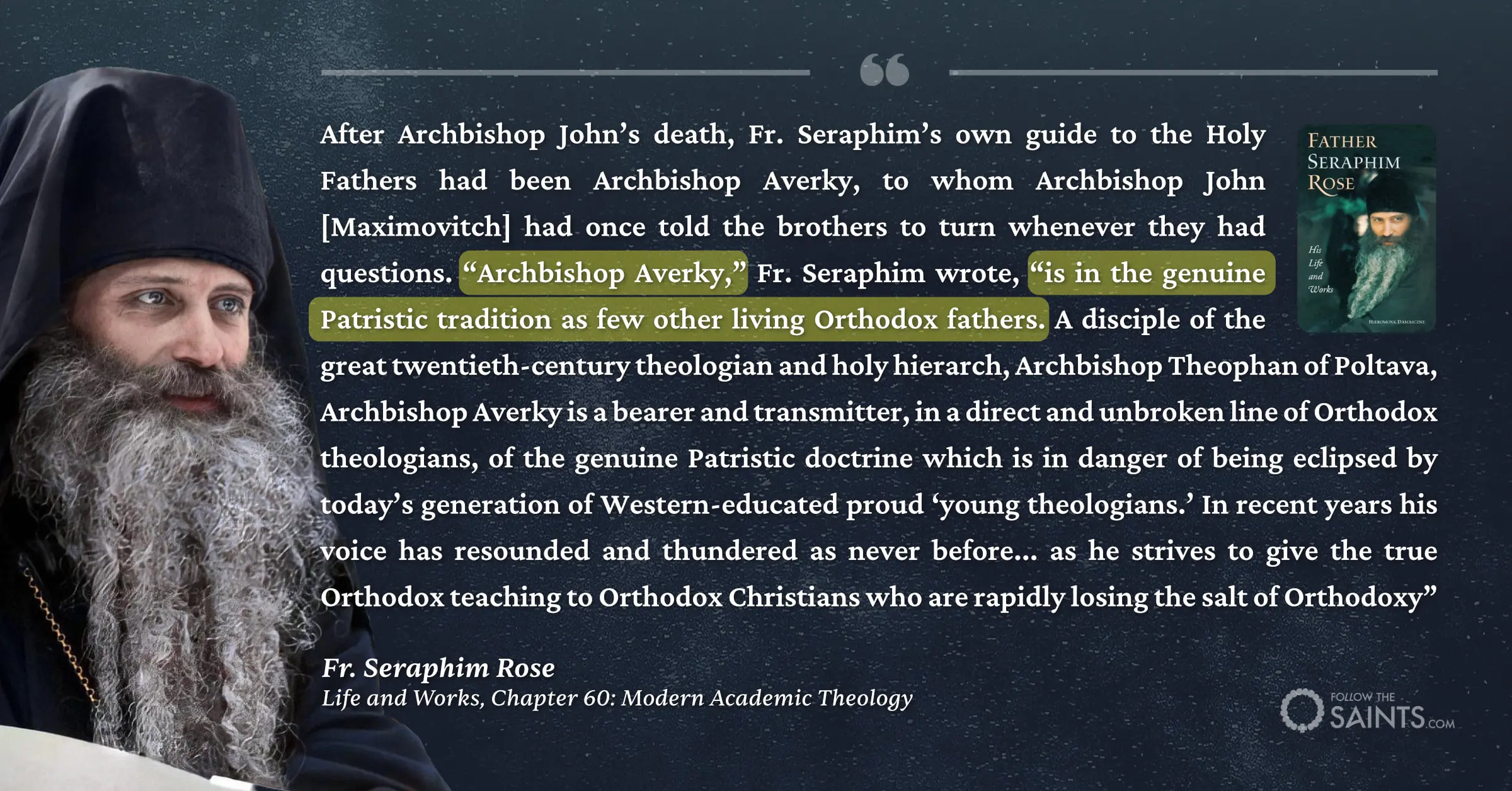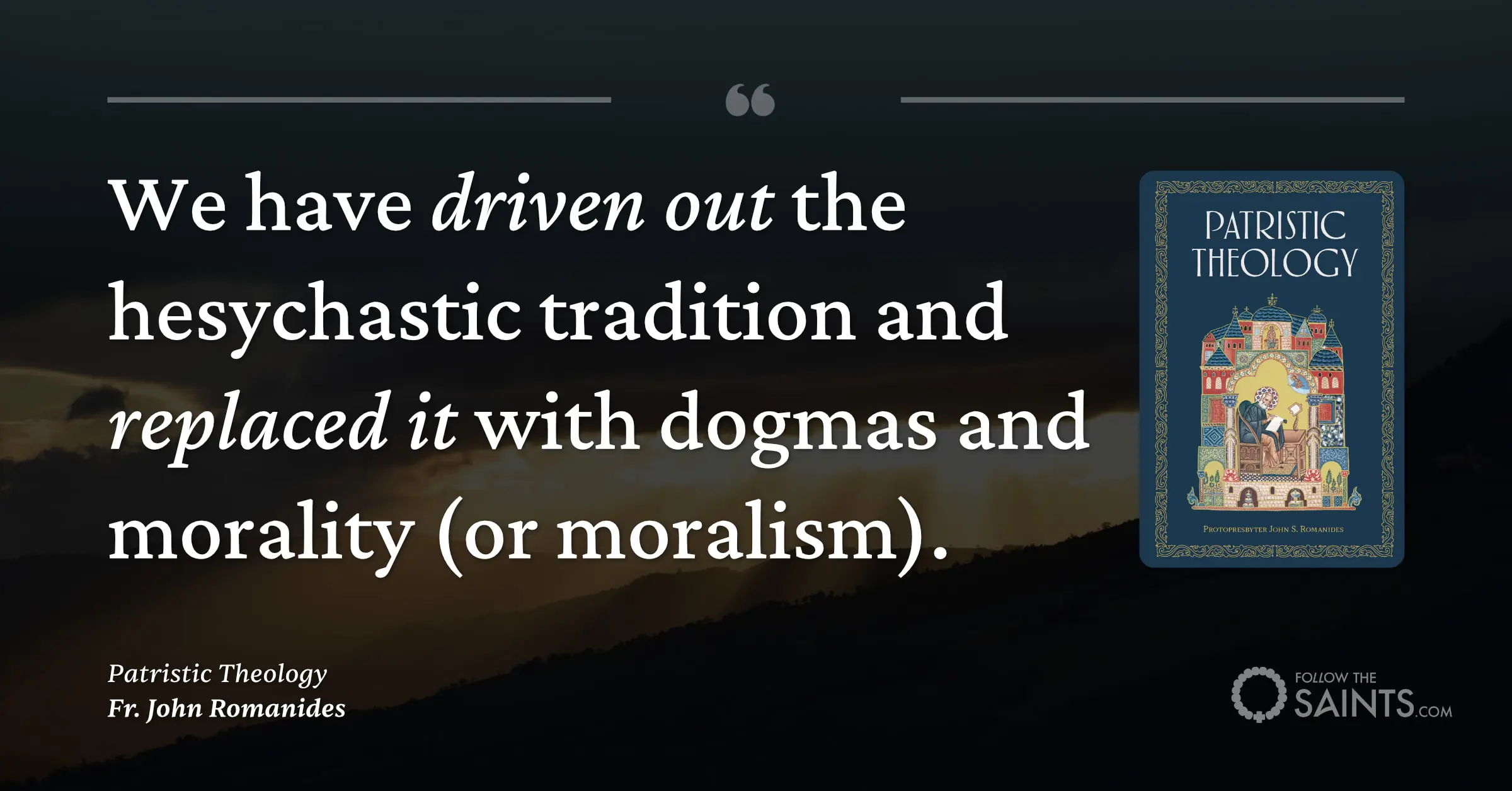On this page
If you’ve been Orthodox for a while, you likely may have seen the following quote:
No matter how “right” you may be on various points, you must be diplomatic also. The first and important thing is not “rightness” at all, but Christian love and harmony. Most “crazy converts” have been “right” in the criticisms that led to their downfall; but they were lacking in Christian love and charity and so went off the deep end, needlessly alienating people around them and finally finding themselves all alone in their rightness and self-righteousness. Don’t you follow them!
— Fr. Seraphim Rose, Life and Works, Chapter 88: Converts
This quote, unfortunately, is one of the most oft-cited and repeated quotes from the saints in our contemporary times. It’s wielded as a weapon, completely divorced from its context, and used to silence those who dare to speak out against modernism and heresy within the Church.
The irony? Fr. Seraphim Rose himself would be guilty of violating this misinterpreted “principle”, as we’ll see later on.
One of the dangers when we read the saints is that we read their words with our own interpretation in mind. We would do ourselves a great disservice by not examining the actual context of this quote. We do this because we desire to discern what HE actually meant by it, not just to come to our own conclusion and interpretation of it.
The Crucial Context
Let’s examine the full context of this quote:
Fr. Seraphim had one spiritual son whom he saw falling into this classic pattern of the “crazy convert” who thinks he knows better than everyone. In a little mission chapel which he had built in his backyard, this man was making an issue over congregational singing versus “partitura” singing by a separate choir. On Pentecost Sunday he had a confrontation in the church with a Russian woman who wanted to have partitura singing. “As I rather bluntly told her,” he wrote to Fr. Seraphim, “I didn’t build a chapel in order to perpetuate error in my own backyard.” In his letter to Fr. Seraphim, he criticized the idea that a person could stand through a Liturgy while a choir did the singing, and said that this was “analogous to going to visit someone in his home and spending the time there with his nose in a magazine.” “I am in no mood to compromise on this issue,” he declared.
In principle, Fr. Seraphim agreed with his spiritual son that congregational singing was to be preferred, but what concerned him most was the man’s attitude. “Beware!” he wrote to him:
— Fr. Seraphim Rose, Life and Works, Chapter 88: Converts
Now, let’s break this down:
- This was advice to a specific spiritual child. Fr. Seraphim knew this person intimately, was addressing a particular situation, and has the authority to correct his spiritual child. Does this mean we should use this quote to passive aggressively judge everyone who speaks out against error in the Church?
- The issue at hand was not dogma, theology, or heresy. It was about a style of singing in church. Most converts have never even heard of partitura singing, let alone care about it. Is it appropriate to use this quote to silence those fighting for Orthodox dogma and tradition?
- The spiritual son was being unnecessarily confrontational. He picked a fight with a Russian woman over a non-dogmatic issue. Is this comparable to those who speak out against genuine heresies infiltrating the Church?
In summary, the use of the current quote is “abusive” when we actually examine the context of it.
The Hypocrisy of Selective Quoting
In the midst of the misusage of this quote, there are many other quotes from Fr. Seraphim Rose that are conveniently ignored:
To guard the truth one must speak straightforwardly about those who depart from it, in order to protect the flock and, if possible, to enlighten those in error. But to every soul the Church opens Her treasures—if only he will listen to the truth and accept what She teaches—which comes from the Holy Spirit—and not his ‘reinterpretation’ of it. With regard to those Orthodox Churches that are departing from the truth, one should be if anything even more outspoken—for their leaders, having known Orthodoxy, are consciously departing from it and trying to lead the flock away with them."
— Fr. Seraphim Rose, letter dated May 5/18, 1970
Here, Fr. Seraphim advocates for speaking out against those departing from Orthodox truth. He even says we should be “more outspoken” about it. How does this square with the misused “diplomacy” quote?
Or consider this:
These three men are traitors to Orthodoxy, on the same level (although more refined) as Patr. Athenagoras and Archbp. Iakovos, and it is time that the Orthodox faithful be informed of this. Archbp. John Shahovskoy for 40 years has been preaching a “poetical” Christianity that is against monasticism and every kind of strict Orthodoxy; Fr. Schmemann is clearly attempting to Protestantize Orthodoxy; and Fr. Meyendorff, by his irresponsible and slanderous attack against the hierarchs and faithful of the Russian Church Abroad (in the Feb. Orthodox Church) shows himself so anxious to follow in their footsteps that he departs even from ordinary honesty and fairness.
— Fr. Seraphim Rose, Letter 37, Bright Saturday, April 19/May 2,1970,
Fr. Seraphim calls these people traitors to Orthodoxy. Is this the “diplomacy” that modern Orthodox hypocrites preach?
Here’s a question we must ask: why are these quotes not as popular? Is it possible… that people are picking and choosing the parts of the saints they wish to follow?
We should strive to embrace all of what the church teaches. And so, if we find ourselves judging other people because they seem to crazily adhere to strict Orthodoxy (as Fr. Seraphim Rose HIMSELF says), but we don’t find ourselves being outspoken against the heresies of our time, maybe we should remove the plank in our own eye, before judging a brother or sister.
The Broader Orthodox Context
Fr. Seraphim Rose followed in the footsteps of saints like St. Ignatius Brianchaninov, St. Theophan the Recluse, St. John Maximovitch, and Archbishop Averky.
Many contemporary Orthodox Christians wouldn’t consider Archbishop Averky “diplomatic.” Do these same people who quote such things, quote him? Do they know what he says? Do they know how strict he was? When we venerate and love a saint, we should care for who venerate as well.

And so we pick and choose saints we agree with, the parts of their writing we agree with, and ignore the rest.
We should read the saints’ works in their entirety, not just the parts that align with our modern, moralistic interpretation of Orthodoxy.
Lives of Saints are one thing desperately needed in America to give a dose of real Orthodoxy for those withering away from the two-dimensional academic Orthodoxy of Schmemann and the new “autocephalous” monstrosity. […] The American Orthodox public is so undernourished with printed food that it has to be educated to know what it should read.
— Fr. Seraphim Rose, Letter 30, written March 16/29, 1970, to Father Photios
Fun fact: The spiritual child referenced in the original out-of-context quote ended up departing from Fr. Seraphim Rose just 8 months later. This departure underscores the importance of context - the very issue Fr. Seraphim was addressing. Many consider Fr. Seraphim Rose to be in the apostolic succession and a saint. His spiritual child’s problem, therefore, was not his zeal for tradition, but his departure from obedience to the saints and the wisdom they offer.
The Danger of Misapplication
When we use Fr. Seraphim’s “diplomacy” quote out of context, we risk silencing those who are genuinely fighting for Orthodox tradition and dogma. We accuse them of lacking love and diplomacy, just as the Pharisees accused Christ of lacking love when He called them out.
Remember, Fr. Seraphim Rose also said the following:
We love to judge others for the strangeness of their behavior; we call them ‘cuckoos’ or ‘crazy converts’. It is true that we should beware of really unbalanced people who can do us great harm in the Church. But what serious Orthodox Christian today is not a little “crazy”? We don’t fit in with the ways of this world; if we do, in today’s world, we aren’t serious Christians. The true Christian today cannot be at home in the world; he cannot help but feel himself and be regarded by others as a little ‘crazy’.
— Fr. Seraphim Rose, Life and Works, Chapter 101: Ad Astera!
Just because Fr. Seraphim Rose correctly said this to his own spiritual child, doesn’t mean he’s given us to go around and give the same criticism to everyone, for any reason we wish.
He’s not telling us to not adhere to strict Orthodoxy. He’s not telling us to judge others. He’s not telling us that only converts are afflicted with this issue. He’s not telling us to not be outspoken. He isn’t implying any of these things.
Conclusion
We must distinguish between unnecessary arguments over minor issues, and the legitimate defense of Orthodox dogma and tradition. Words like diplomacy, love, harmony must be understood as our saints used them, not through our own moralistic, worldly lens.

When people start sharing all the “unpopular” quotes from Fr. Seraphim Rose as well, and actually read his works in full, then we can sit at their feet and learn from them. Until then, we must reject their non Orthodox interpretations.
Pain of heart is what separates crazy converts and careless Orthodox from true strugglers.
— Fr. Seraphim Rose, Life and Works, Chapter 88: Converts
Do we know what pain of heart actually is? Do we have it? Do we practice ceaseless prayer?
Maybe we should focus on that, instead of misusing quotes out of context to judge our brothers and sisters in Christ (in non dogmatic issues).
Let’s heed Fr. Seraphim’s wisdom and stop fixating on “crazy converts.” Instead, let’s turn our gaze inward, examining our own hearts and spiritual struggles. After all, the pitfalls that ensnare converts are the same ones that can trip up any believer.
Through the prayers of our Holy Father, Fr. Seraphim Rose, and all his teachers, including St. Theophan the Recluse, Archbishop Averky, St. Paisius Velichcovsky, and St. John Maximovitch, O Lord Jesus Christ our God, have mercy on us and save us. Amen.
